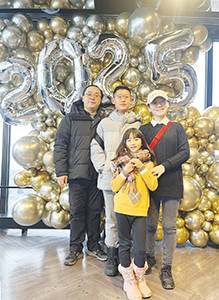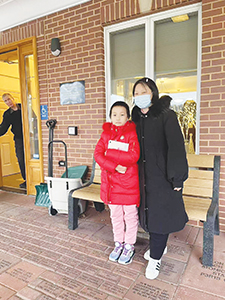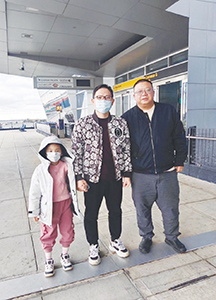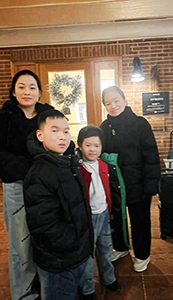Welcoming Chinese Children with Illnesses and Their Families with Love


The author and his family of four
Many have asked why, as a Canadian, I travel to New York to help transport Chinese children with cancer to Pennsylvania Children’s Hospital for treatment. While God’s inspiration guides me, the personal experiences my wife and I have shared make this mission even more meaningful. We simply cannot miss the opportunity to share the gospel with these families. More than just a journey, this ministry is an act of love—offering hope and guiding these families toward eternal life.
Outside the entrance, I noticed an elderly, tall white security guard, deep in thought. I recognized him immediately—he had been there back in August when my family transported a sick child from Anhui, China. After a five-and-a-half-hour drive, we had arrived at Ronald McDonald House late at night, greeted by this same guard.
At 11 PM, the chill in Hershey lingered, but his warm welcome made all the difference. Not only did he open the door for us, but he personally guided us through the check-in process. Later, he showed the sick child and my son around the living space, opened a cabinet full of brand-new toys, and said with a kind smile, “You can take any of these toys.” Instantly, their faces lit up with joy.
For these families, the journey begins in their hometowns, traveling by car to Shanghai, where they undergo blood tests at a partner hospital to confirm eligibility for treatment in Pennsylvania. Once approved, they coordinate with hospital nurses to book rooms at Ronald McDonald House and purchase their own plane tickets. After multiple flight transfers, they finally arrive in New York—a grueling three-day journey, often sustained only by instant noodles, leaving them weak and exhausted.

Mother and daughter arrived at
Ronald McDonald House.
Determined to bring them comfort, I drove my Ontario-plated car to the nearest Chinese supermarket, eager to prepare a steaming hot meal. My cooking skills were modest—I could manage pan-fried buns, porridge, stir-fried vegetables, and scrambled eggs with tomatoes. Thankfully, my wife’s culinary talents elevated the meal with a delicious braised pork dish.
Watching the children devour the food, their pale faces gradually regaining color, filled us with relief and joy.
Later that evening, the same elderly security guard, now off-duty, approached shyly and asked about Mandarin pronunciation. He explained that he was diligently learning Chinese to communicate directly with sick children and better serve the families arriving from China. His sincerity moved me.
The staff at Ronald McDonald House are extraordinary—each room is equipped with instructions written in simplified Chinese characters, ensuring that every family feels welcome. Their kindness, like the warmth of a home-cooked meal, reminds us that love transcends borders and language barriers.

Providing care for sick children
One night at Ronald McDonald House, I met a mother who was relatively better off than others. She had hired a private car and brought along a translator. As she sat with us, eating braised pork, she received a call from the hospital in Shanghai—her child’s cancer had relapsed. The news shattered her. Tears streamed down her face as she struggled to process the weight of what it meant: her child might have less than two years to live.
Many of the families arriving here are financially struggling. Some resort to frozen fast food from the fridge, hesitant to accept an invitation to dinner. I later learned that these families included single parents, low-income households, and rural residents. Some had children diagnosed with stage-four cancer.
Most of these children bear the visible signs of their illness—frail bodies, disproportionately large heads, no hair. They rarely get the chance to attend school. Their days are spent gripping tablets, lost in video games.
I turned to my son and asked, “Do you envy them for being able to play games all day?” Back in Toronto, he cherished his weekend gaming sessions. But this time, after a moment of reflection, he said softly, “No, I just wish they could go to school too.” His eyes dimmed with sadness as he spoke.

The sick child is
accompanied by family
When one of our drivers heard their story and saw their exhausted state, he immediately bought them breakfast out of kindness.
The dedication of the drivers is extraordinary. They wait for hours in the middle of the night at New York’s JFK Airport before embarking on the long drive to Hershey, Pennsylvania. The winding mountain roads have no streetlights, making the journey physically and mentally draining. By the time they arrive at Ronald McDonald House, it is often five in the morning. Yet, if these trips exhaust the drivers, how much more must they take a toll on the families of sick children?
Many ask why we—a group of Canadians—travel all the way to the U.S. to transport sick children. It all began with a simple request. One of my wife’s classmates reached out, saying her child needed treatment in the U.S. and asking if we could help.
At first, the idea seemed daunting—the round trip to New York alone is nearly 1,000 kilometers, and Pennsylvania is even farther. But after praying together, in August, God’s voice was clear: “You should go.”
So, we went, only to realize that this was much bigger than one family in need. The number of families seeking assistance was staggering. Though our strength was limited, we did all we could to transport these children.
Later, more brothers and sisters joined our efforts. As we shared these stories in various settings, many were deeply moved and offered generous support. So far, we have raised $17,100.
Thanks be to God—when Reverend Mike Chan, General Secretary of the Chinese Christian Herald Crusades in New York, heard about the situation, he responded immediately, facilitating the establishment of the CCHC Children Cancer Care Ministry.
I firmly believe that this ministry is a reflection of God’s unconditional love. The compassion of brothers and sisters mirrors the love of Jesus—freely given, expecting nothing in return. Moreover, it presents a powerful evangelistic opportunity. These families endure long journeys, spending extended hours in the car, providing a unique chance for them to engage with believers and hear the Gospel.
If we can later invite these families to church activities or offer care and support during their treatment, it will be a meaningful extension of our outreach.
At its heart, this ministry is more than transportation—it is a call of love, a guiding light that leads these families toward eternal hope. My deepest prayer is that more believers will join in, allowing families of sick children from China to experience the love of Christ.
May the Gospel return with them to their homeland, where they can personally testify to God’s grace and glorify His name.
 Rufus Chan
Rufus Chan





